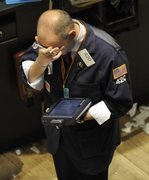 James Surowiecki has a good primer on why nothing worked to counter the flurry of selling in the markets. Here’s the key part of his argument, but do read the whole thing:
James Surowiecki has a good primer on why nothing worked to counter the flurry of selling in the markets. Here’s the key part of his argument, but do read the whole thing:
“Rating agencies and Wall Street analysts are always with us. But the most destructive procyclical force in today’s market is relatively new—hedge funds. There’s an irony here: hedge funds have been touted as a great countercyclical force. Because hedge-fund investors, unlike mutual-fund investors, usually can’t pull their money out on a daily basis, the funds were supposed to be able to take a longer-term view and pursue contrarian strategies (like the hedge-fund manager John Paulson’s huge bets against the subprime bubble). Because they can follow myriad investment strategies—selling short as well as going long, trading derivatives, and so on—they were supposed to add diversity to the market. And the growing influence of hedge funds did indeed coincide with a decline in market volatility. A study by the Federal Reserve Bank of Cleveland showed that hedge funds generally made markets more stable.
Unfortunately, what was true of normal markets has turned out to be irrelevant in a crisis. Hedge-fund investors can’t ask for their money back tomorrow, but they commonly can ask for it at the end of any quarter, and after the market’s tumble this summer many of them did just that—to the tune of more than forty billion dollars in September alone, according to one estimate. The funds had to raise cash to meet those redemptions, which led them to dump stocks seemingly without regard to price. This colossal liquidation led stocks with a high percentage of hedge-fund ownership to fall, in some cases, forty or fifty per cent in a matter of weeks. The problem was magnified by the fact that the funds inevitably piggyback on one another’s trades, which made the selling feed on itself. And the faster funds’ positions shrank the more shares they had to sell in order to raise cash. The process was made still more destructive by many hedge funds’ reliance on leverage—funds often make bets totalling four or five times their capital. On the way up, leverage is great for maximizing returns. On the way down, it’s great at maximizing pain.
The great paradox of the sell-off, then, is that the factors that were supposed to increase the flow of information to investors, foster long-term thinking, and encourage contrarian positions did exactly the opposite.”







Comments